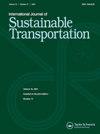Enhancing bikeshare planning and operation: Strategic use of web-based public feedback
IF 3.1
3区 工程技术
Q2 ENVIRONMENTAL STUDIES
International Journal of Sustainable Transportation
Pub Date : 2024-11-04
DOI:10.1080/15568318.2024.2424419
引用次数: 0
Abstract
Bikeshare system operators have leveraged online platforms to gather user feedback on station experiences and service quality. This crowdsourced data presents a valuable opportunity to enhance bikeshare planning and operations. However, planners have limited methods to analyze those qualitative data given the sparse nature of this data, which is insufficient for training comprehensive machine learning models. Addressing this challenge, our study employs a novel approach combining spatial analysis and Factor Analysis of Mixed Data (FAMD) to delve into bikeshare users’ perceptions and expectations. Focusing on Chicago’s bikeshare system, we utilize its limited online comments to demonstrate the robustness of our algorithm and its applicability to both large and small datasets. Our findings reveal a geographic pattern in feedback: negative comments on bike rebalancing, station locations, and facilities are concentrated in the city center, while dissatisfaction with the cycling environment is consistent across both urban and peripheral areas. Moreover, we discovered that the demographic and employment characteristics of areas surrounding bikeshare stations significantly influence positive feedback, overshadowing the impact of station design and local infrastructure. Overall, this study offers a quantitative framework for leveraging limited crowdsourced feedback effectively, providing strategic insights for refining bikeshare planning and operational decisions.
加强共享单车的规划和运营:策略性地利用基于网络的公众反馈
共享单车系统运营商利用在线平台收集用户对站点体验和服务质量的反馈。这种众包数据为加强共享单车的规划和运营提供了宝贵的机会。然而,考虑到这些数据的稀疏性,规划人员分析这些定性数据的方法有限,这不足以训练全面的机器学习模型。为了应对这一挑战,我们的研究采用了一种结合空间分析和混合数据因素分析(FAMD)的新方法来深入研究共享单车用户的感知和期望。以芝加哥的自行车共享系统为例,我们利用其有限的在线评论来证明我们算法的稳健性及其对大型和小型数据集的适用性。我们的研究结果揭示了反馈的地理格局:对自行车再平衡、车站位置和设施的负面评论集中在城市中心,而对自行车环境的不满在城市和周边地区都是一致的。此外,我们发现,共享单车站点周边地区的人口和就业特征显著影响正反馈,掩盖了站点设计和当地基础设施的影响。总体而言,本研究为有效利用有限的众包反馈提供了一个定量框架,为完善共享单车规划和运营决策提供了战略见解。
本文章由计算机程序翻译,如有差异,请以英文原文为准。
求助全文
约1分钟内获得全文
求助全文
来源期刊
CiteScore
8.90
自引率
2.60%
发文量
56
期刊介绍:
The International Journal of Sustainable Transportation provides a discussion forum for the exchange of new and innovative ideas on sustainable transportation research in the context of environmental, economical, social, and engineering aspects, as well as current and future interactions of transportation systems and other urban subsystems. The scope includes the examination of overall sustainability of any transportation system, including its infrastructure, vehicle, operation, and maintenance; the integration of social science disciplines, engineering, and information technology with transportation; the understanding of the comparative aspects of different transportation systems from a global perspective; qualitative and quantitative transportation studies; and case studies, surveys, and expository papers in an international or local context. Equal emphasis is placed on the problems of sustainable transportation that are associated with passenger and freight transportation modes in both industrialized and non-industrialized areas. All submitted manuscripts are subject to initial evaluation by the Editors and, if found suitable for further consideration, to peer review by independent, anonymous expert reviewers. All peer review is single-blind. Submissions are made online via ScholarOne Manuscripts.

 求助内容:
求助内容: 应助结果提醒方式:
应助结果提醒方式:


